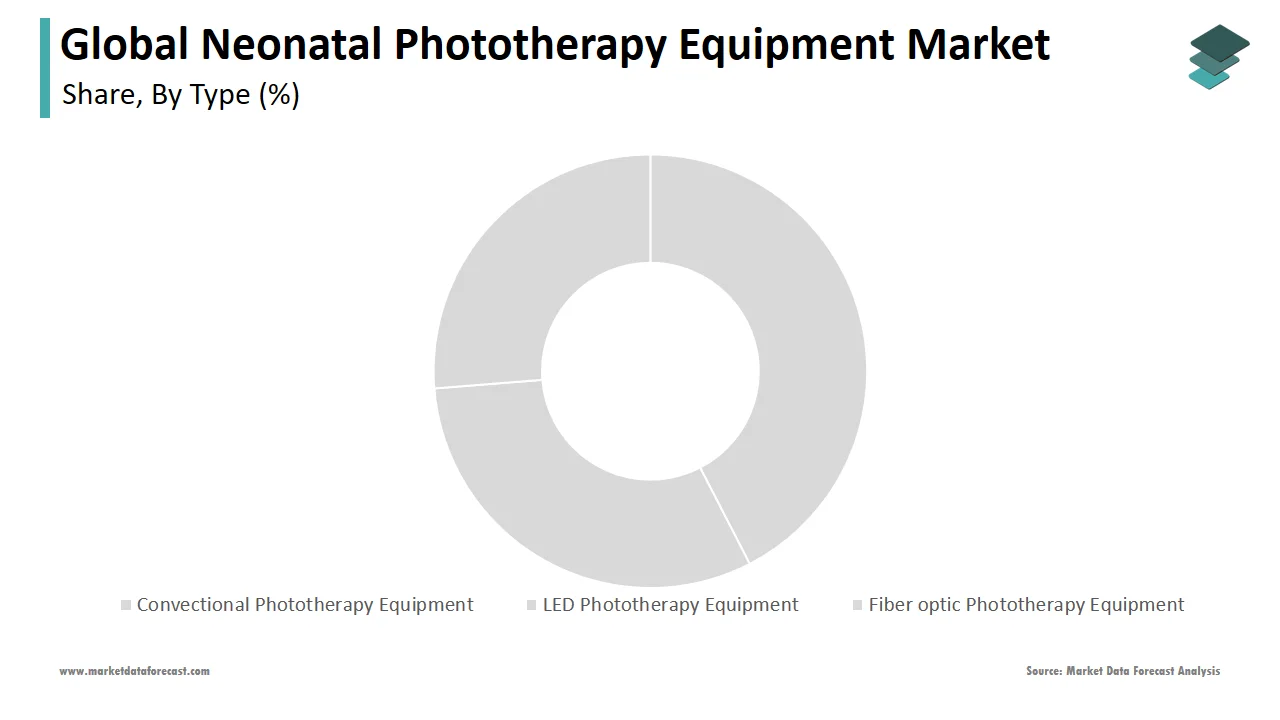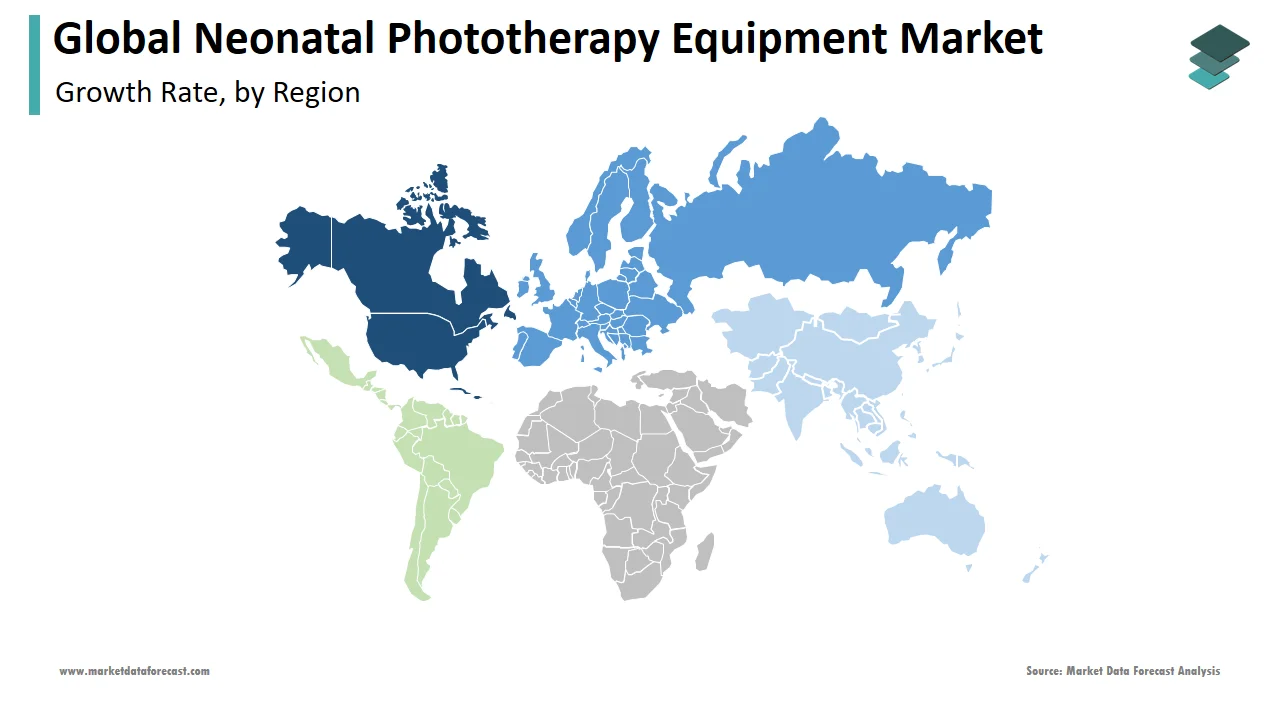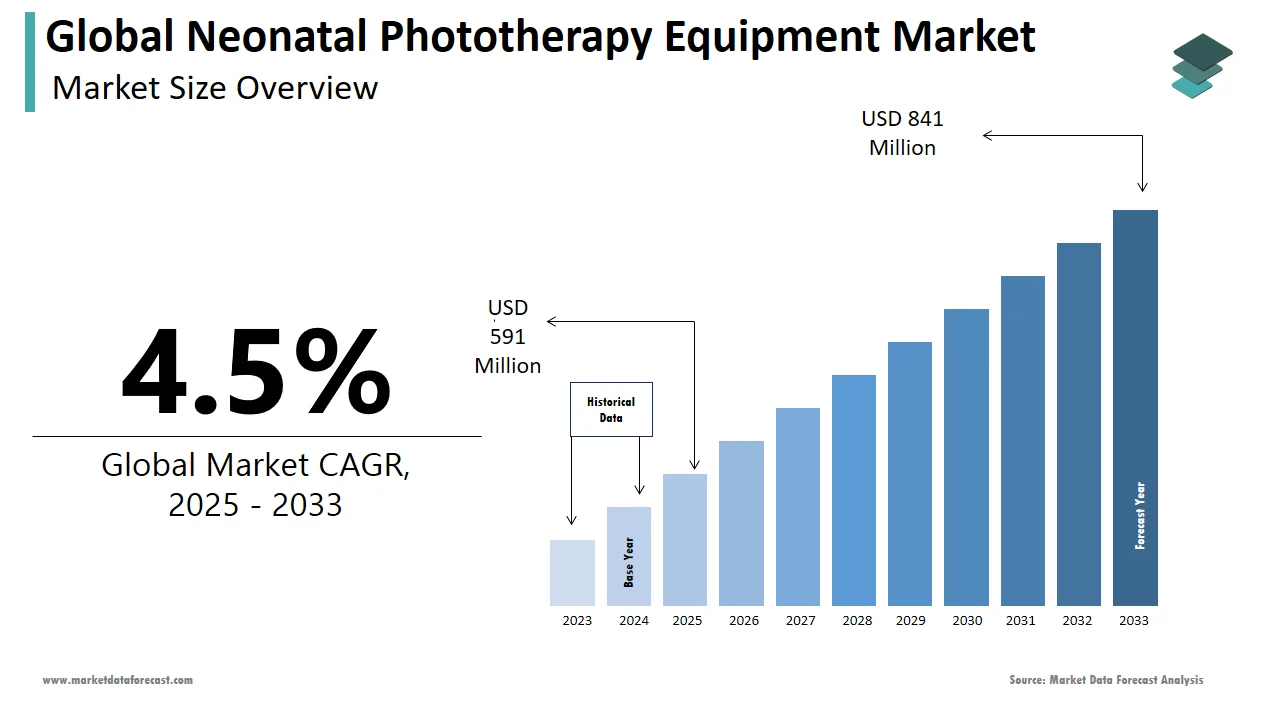Global Neonatal Phototherapy Equipment Market Size, Share, Trends & Growth Forecast Report By Type, End User, Application and Region (North America, Europe, Asia-Pacific, Latin America, Middle East and Africa), Industry Analysis From 2025 To 2033.
Global Neonatal Phototherapy Equipment Market Size
The global neonatal phototherapy equipment market was worth US$ 566 million in 2024 and is anticipated to reach a valuation of US$ 841 million by 2033 from US$ 591 million in 2025, and it is predicted to register a CAGR of 4.5% during the forecast period 2025-2033.
MARKET DRIVERS
Technological advancements, Y-O-Y growth in the incidence of jaundice among newborn babies, and growing awareness are a few of the significant factors driving the global neonatal phototherapy equipment market.
According to the Scholars Journal of Medical Sciences, around 25-40% of newborn babies are diagnosed with jaundice every year. D-Rev has invented LEDs for jaundice treatment, and these LEDs use the amount of energy needed and lasts for the long term compared to fluorescent lamps. According to the Stanford Medical Schools, the research regarding these LEDs was conducted with partnering D-Rev and demonstrated jaundice treatment for its efficiency. Advancements in the healthcare devices industry and phototherapy equipment deliver better home care and are another significant factor promoting the global neonatal phototherapy equipment market. The growing number of births with jaundice in developed and developing countries and rising awareness levels among the people regarding novel treatments and adopting the latest technologies are further expected to boost the global neonatal phototherapy market growth.
MARKET RESTRAINTS
Side effects associated with phototherapy are likely to hamper the market growth. The equipment used for the phototherapy treatment doesn’t succeed in particular times, and this factor is expected to restrain the global neonatal phototherapy market growth. Strict rules and regulations by the governments in approving new treatment procedures regarding people’s safety are hampering the growth of the neonatal phototherapy equipment market.
Impact Of COVID-19 on the Neonatal Phototherapy Equipment Market
[May 2020] COVID-19 is an incomparable global public health emergency that has affected almost every sector. The COVID-19 pandemic has posed a significant challenge for neonatal phototherapy equipment as manufacturing services, and distribution channels are inactive worldwide. The governments have imposed strict guidelines to follow during the lockdown period. The doctors and other medical staff are on the frontline acting as warriors in battling against the COVID-19. Women admitted to the hospitals for their delivery taken acute care to prevent from being affected by the virus. All the devices used to treat premature babies and with low weight are taken care of, such as cleaning, sanitizing the premises, and correctly sterilizing before usage. After the lockdown period, all the manufacturing devices required for phototherapy for newborn babies resumed their activities, creating high revenue and economy.
REPORT COVERAGE
|
REPORT METRIC |
DETAILS |
|
Market Size Available |
2024 to 2033 |
|
Base Year |
2024 |
|
Forecast Period |
2025 to 2033 |
|
CAGR |
4.5% |
|
Segments Covered |
By Type, End-User, Application, and Region. |
|
Various Analyses Covered |
Global, Regional, and country-level analysis; Segment-Level Analysis, DROC; PESTLE Analysis; Porter’s Five Forces Analysis, Competitive Landscape; Analyst Overview of Investment Opportunities |
|
Regions Covered |
North America, Europe, APAC, Latin America, Middle East & Africa |
|
Market Leaders Profiled |
G.E. Healthcare (U.S.), Philips Lighting Holding B.V. (Netherlands), Natus Medical Incorporated (U.S.), Phoenix Medical Systems Pvt. Ltd. (India), Herbert Waldmann GmbH & Co. K.G. (Germany), Atom Medical Corporation (Japan), Neotech Medical Systems Pvt. Ltd. (India), National Biological Corp. (U.S.) and Solarc Systems Inc. (Canada)., and Others. |
SEGMENTAL ANALYSIS
By Type Insights

Based on the type, the LED phototherapy equipment segment is forecasted to lead the global neonatal phototherapy equipment market during the forecast period. LED acts as a source to focus the required wavelength light on the affected area, and the treated time associated with the LEDs is less when compared with that of conventional devices. Factors such as growing cases of neonatal jaundice and high adoption of LED phototherapy equipment for targeted diseases primarily support the growth of the segment. These LED devices require low space, consume less electricity, and also provide higher irradiances.The conventional phototherapy equipment segment is expected to perform well during the forecast period. This segment has involved vast application areas such as psoriasis and eczema-related skin diseases. It can be used for treating infants and preterm neonates who have jaundice and in adults with vitiligo.
By End-User Insights
Based on the End User, the hospitals and clinics segment is estimated to dominate the global neonatal phototherapy equipment market during the forecast period. The increasing number of skincare clinics in both the developed and developing countries is one of the significant factors that boost the segment's growth rate. Additionally, the growing number of initiatives by the governments to improve healthcare for newborn babies and the rise in neonatal jaundice cases are expected to accelerate the demand for hospitals and clinics segment. The home users’ segment is expected to gain momentum during the forecast period.
By Application Insights
Based on the application, the skin diseases treatment is predicted to hold domination over the other segment during the forecast period due to the high incidence rate of skin disorders such as psoriasis, vitiligo, and other skin diseases. The Neonatal jaundice management is forecasted to hike at a healthy CAGR during the forecast period. An increasing number of births with jaundice require phototherapy treatment to act favorably to the segment's growth.
REGIONAL ANALYSIS

Regionally, the North American market is estimated to play the leading role in the global neonatal phototherapy equipment market during the forecast period. Factors such as the growing number of people suffering from skin disorders and a rise in neonatal jaundice cases primarily support the North American market. The presence of well-developed infrastructure, the availability of technologically developed treatment options, and numerous initiatives by the North American governments to improve a newborn baby's health favor market growth. The United States neonatal phototherapy market is forecasted to lead the North American market during the forecast period. According to the Centre for Disease Control and Prevention (CDC), in 2023, preterm births affected about one in every ten infants born in the U.S. The average cost of the infants hospitalized in the neonatal intensive care units (NICUs) is more than 3,000 USD per day. The Canadian neonatal phototherapy equipment market is expected to grow at a promising rate during the forecast period.
Globally, the European market is predicted to be the second-largest regional market during the forecast period. The vast patient pool, growing expenses for healthcare, and rapid healthcare developments are a few factors helping the European market grow further during the forecast period. The UK neonatal phototherapy equipment market is estimated to dominate the European market between 2025 to 2033. Availability of technological advancements for infant and maternal care is one of the key factors supporting the UK market. The German neonatal phototherapy equipment market is forecasted to showcase a healthy growth rate during the forecast period. A growing number of hospitals, increasing frequency of acquired infections in newborn babies, and a huge patient pool in preterm and low weight babies are expected to support the German phototherapy market.
The neonatal phototherapy equipment market in Asia-Pacific is predicted to be the fastest-growing region globally during the forecast period. Rising awareness regarding advanced phototherapy and improving healthcare infrastructure and the growing incidence of neonatal jaundice cases in newborn babies are expected to boost the APAC market during the forecast period. The Chinese neonatal phototherapy equipment market is estimated to lead the APAC market during the forecast period. On the other end, the Indian market is expected to have a lucrative growth rate between 2025 to 2033.
The Latin American market is projected to grow at a steady growth rate during the forecast period. Factors such as increasing adoption of new technologies and rising expenses in healthcare are to escalate the market demand. The Brazilian market is predicted to lead the Latin American market during the forecast period. The rise in disposable income has spelled the growth of the neonatal phototherapy devices market growth.
The Middle East & Africa market is forecasted to grow at a sluggish rate during the forecast period. The growing number of premature babies with low weight is expected to drive the MEA market.
KEY MARKET PLAYERS
Some of the notable companies operating the global neonatal phototherapy equipment market profiled in the report are G.E. Healthcare (U.S.), Philips Lighting Holding B.V. (Netherlands), Natus Medical Incorporated (U.S.), Phoenix Medical Systems Pvt. Ltd. (India), Herbert Waldmann GmbH & Co. K.G. (Germany), Atom Medical Corporation (Japan), Neotech Medical Systems Pvt. Ltd. (India), National Biological Corp. (U.S.) and Solarc Systems Inc. (Canada).
RECENT MARKET HAPPENINGS
-
In February 2019, G.E. Healthcare invented a new phototherapy system named BiliSoft™ 2.0 Phototherapy System for infants with jaundice. It is used to treat hyperbilirubinemia and offers quality care.
-
The NatusMedical incorporated has invented neoBlue LED phototherapy for the treatment of infants with jaundice. This device reduces cost and is promoting excellence in patient care.
MARKET SEGMENTATION
This research report on the global neonatal phototherapy equipment market has been segmented and sub-segmented based on type, end-user, application, and region.
By Type
- Convectional Phototherapy Equipment
- LED Phototherapy Equipment
- Fiber optic Phototherapy Equipment
By End-User
- Hospital & Clinics
- Home Users
By Application
- Skin disease treatment
- Neonatal Jaundice Management
By Region
- North America
- Europe
- Asia-Pacific
- Latin America
- The Middle East and Africa
Related Reports
Access the study in MULTIPLE FORMATS
Purchase options starting from $ 2500
Didn’t find what you’re looking for?
TALK TO OUR ANALYST TEAM
Need something within your budget?
NO WORRIES! WE GOT YOU COVERED!
Call us on: +1 888 702 9696 (U.S Toll Free)
Write to us: [email protected]

